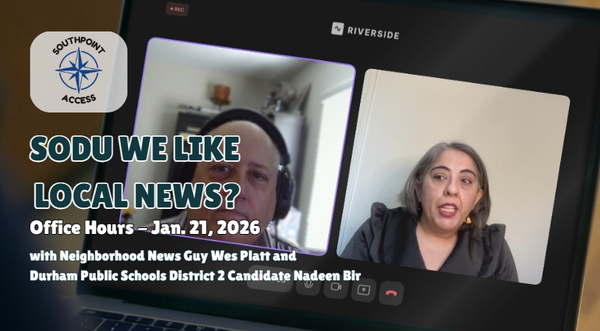[Raising Durham] To Bot or Not to Bot? How AI Became My Ride or Die
The journey from AI skeptic to enthusiast wasn't exactly smooth sailing. As a content marketer, my first reaction was self-preservation – would these language learning models render my creative brain obsolete?
![[Raising Durham] To Bot or Not to Bot? How AI Became My Ride or Die](/content/images/size/w1200/2025/01/DALL-E-2025-01-15-16.16.22---A-vibrant-and-playful-illustration-of-a-confident-woman-in-her-late-40s-with-light-colored-hair--blonde-or-light-brown--sitting-at-a-desk--interacting.webp)
"Is it live, or is it Memorex?" That question defined a generation's wonder at technology that could perfectly capture reality. (If you're drawing a blank, ask your parents about cassette tapes—or just ask me, since I'm clearly dating myself here.)
These days, I find myself wrestling with an eerily similar question: Is it human, or is it Artificial Intelligence (AI)? Just like those old commercials where you couldn't tell the difference between a recorded voice and a live one, I'm now living in a world where AI can write my emails, plan my meals, and even roast my Instagram profile with surprisingly caustic human wit. It's both fascinating and slightly unnerving
A year ago, I was quick to dismiss AI as just another “next big thing” that I was fully prepared to sit out. After all, I'm from the generation that watched technology evolve from mixtapes to LimeWire to Spotify. (Dial-up internet, anyone?)
Each leap forward came with its own learning curve and its own set of concerns. Yet here I am, not just accepting AI, but also emphatically embracing it as my personal assistant, creative collaborator, and digital problem-solver.
The journey from AI skeptic to enthusiast wasn't exactly smooth sailing. As a content marketer, my first reaction was self-preservation – would these language learning models render my creative brain obsolete? But like most changes in life that are accompanied by anticipatory anxiety, the reality turned out to be far less dystopian than my imagination. Rather than replacing my creativity, AI has become something of a professional wingman. It handles the mind-numbing minutiae and tackles those pesky copy-editing tasks that used to eat up hours of my day, leaving me free to focus on what I do best: strategizing, connecting, and creating.
An interesting observation – I keep catching myself treating AI like a sentient being that deserves common courtesy. "Thanks so much for your help!" I type, before remembering I'm essentially expressing gratitude to a very sophisticated calculator. Just yesterday, I apologized to ChatGPT for asking it to “try again” on a prompt whose outcome was not aligned with what I needed. The line between AI tool and AI companion gets blurrier by the day, even as I remind myself that it's crucial to fact-check its output and never assume it's infallible. (Trust but verify, as they say, especially when it comes to technology that occasionally hallucinates facts.)
Where AI has really proven its worth is in the chaos of single-parent life, where there never seem to be enough hours in the day. It's become my secret weapon in managing the everyday logistics that used to leave me feeling overwhelmed:
- Meal Planning and Grocery Lists: Instead of staring blankly into my fridge at 6 p.m., I now have AI helping me turn random ingredients that we already have into actual meals. It's like having a personal chef who doesn't judge my pantry choices.
- Homework Help: When my daughter comes home with math problems that make me question everything I learned in school, AI steps in as a patient tutor, breaking down complex concepts into bite-sized steps.
- Family Scheduling: Between work deadlines, school activities, and life's general chaos, AI helps keep our calendar from becoming a modern art masterpiece of overlapping commitments.
- Budgeting and Financial Planning: From tracking monthly expenses to helping create realistic savings goals for college funds, AI has become an invaluable tool in keeping our household finances on track. It helps spot spending patterns I might have missed and suggests practical ways to trim our budget without making life feel like one endless compromise.
Of course, AI isn't some magical solution that will suddenly make life perfect. It won't fold your laundry (yet) or explain to your tween they can’t scroll their screen for hours on end. And it's important to remember that while AI is impressively capable, it's not infallible—always double-check its suggestions, especially for important decisions or when accuracy really matters.
So if you're still viewing AI as either a terrifying glimpse of our robot overlord future or just another tech trend to ignore, I'd encourage you to take a second look. Start small—maybe let it help plan next week's meals or brainstorm ideas for that work project you've been putting off. And if you're feeling brave, ask it to roast your social media presence.
Just don't be surprised if you find yourself saying "thank you" afterward – apparently, I'm not the only one who can't help but be polite to our new digital assistants.
Heather Hindin is a Durham-based educator and single parent to 11-year-old Harper. With a career dedicated to equity in education, Heather brings both professional insight and personal experience to Southpoint Access. As the mother of a pediatric cancer survivor, she understands the importance of community and candor in overcoming parenting challenges. Together, Harper and Heather advocate for pediatric cancer awareness and research. They've founded Harper's Home, a non-profit providing affordable housing to families with children receiving treatment at Duke. Heather's column offers a blend of practical advice, compassion, and community engagement, drawn from her journey as an educator, advocate, and most importantly, a mom.
Check out previous Raising Durham columns!





